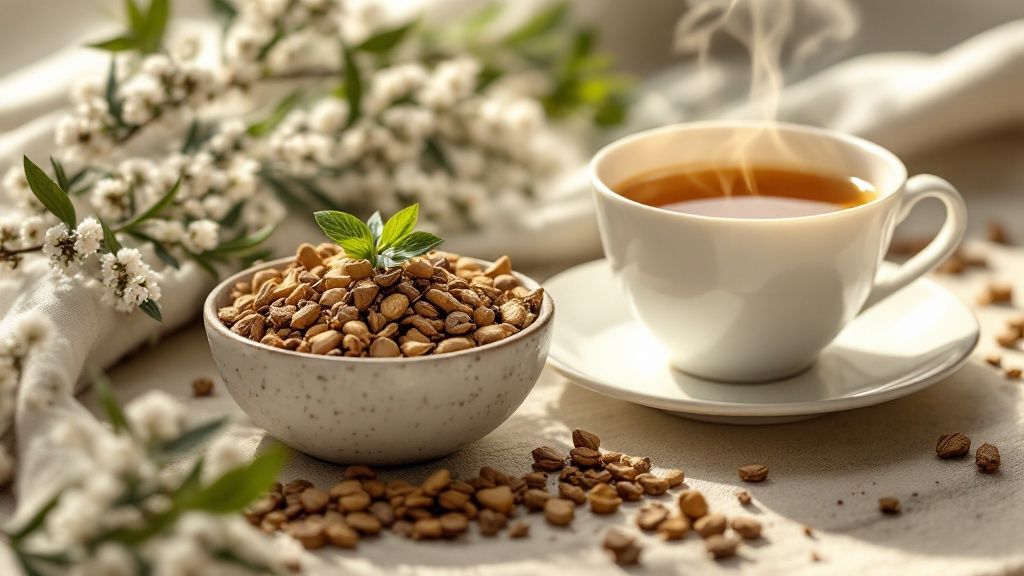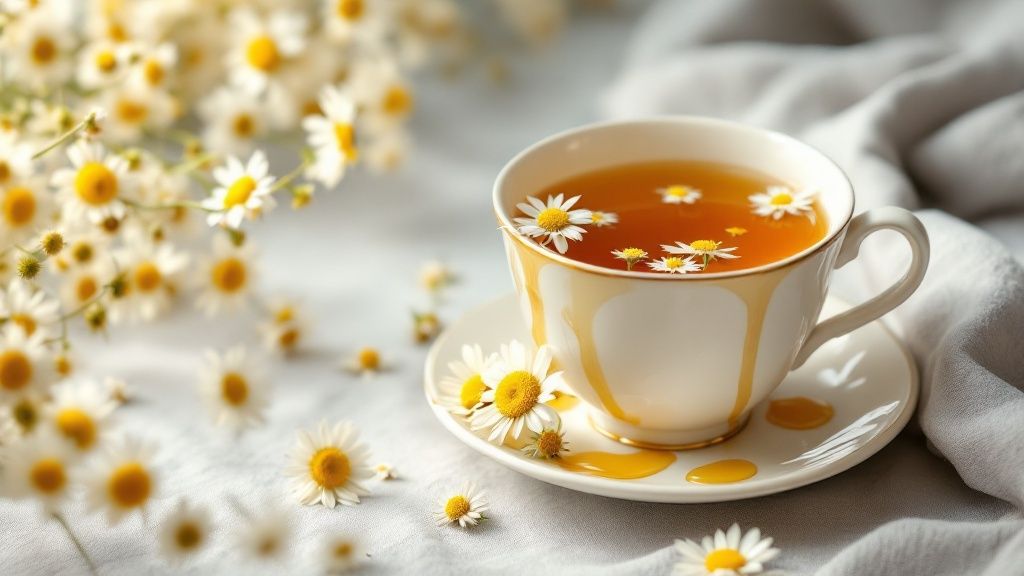Seeking Restful Nights? Explore These Natural Sleep Remedies
Struggling to get a good night's sleep? This listicle explores ten natural sleep remedies, including SMOKO CBD products, to help you find relief. Discover how these remedies, from chamomile tea to valerian root and CBD oil, can promote deeper, more restorative sleep. We'll delve into how CBD, derived from the hemp plant, interacts with the body's endocannabinoid system, potentially easing anxiety – a common culprit behind poor sleep. Learn about the different types of CBD (broad-spectrum, isolate, and full-spectrum) offered by SMOKO and find a suggested dosing regimen. We'll also examine the link between anxiety and sleep and cite research supporting CBD's role in sleep improvement (e.g., Shannon et al., 2019). If you're seeking natural sleep remedies, this list offers valuable insights.
1. Melatonin Supplements
Melatonin is a hormone naturally produced by the pineal gland in the brain. It plays a crucial role in regulating your sleep-wake cycles, also known as your circadian rhythm. When it gets dark, your body naturally produces more melatonin, signalling to your system that it's time to sleep. Melatonin supplements work by mimicking this natural process, making them a popular choice for those struggling with insomnia, jet lag, or shift work sleep disorder. They essentially tell your body it's bedtime, even if your internal clock is confused.

Melatonin's widespread availability over-the-counter and generally mild side effects contribute to its popularity as a natural sleep remedy. It's available in various forms, from traditional pills and capsules to gummies and liquids, even time-release formulations for sustained support throughout the night. Dosages typically range from 0.5mg to 10mg, making it adaptable to individual needs. It’s important to note that melatonin is considered a dietary supplement, not a drug, and is generally non-habit forming, unlike some prescription sleep medications.
Studies have shown the efficacy of melatonin for specific sleep challenges. For example, MIT research demonstrated its effectiveness in resetting circadian rhythms, particularly helpful for jet lag, while other clinical trials have shown that time-release melatonin can improve sleep quality in older adults with insomnia. While melatonin can be a helpful tool, it's important to be aware of the potential drawbacks. Some individuals experience morning grogginess, headaches, or vivid dreams. Long-term safety data is still limited, and melatonin can interact with certain medications, such as blood thinners and immunosuppressants. Furthermore, the quality and dosage can vary significantly between brands, so choosing a reputable supplier and a USP Verified or third-party tested product is crucial.
To maximise the benefits of melatonin and minimise potential side effects, start with the lowest effective dose (0.5-1mg) and take it 30-60 minutes before bedtime. It's generally recommended to use melatonin short-term or cyclically rather than continuously.
While melatonin addresses the timing of sleep, another natural remedy gaining popularity is CBD. CBD, short for cannabidiol, is a compound derived from the hemp plant, a variety of Cannabis sativa. Unlike its cousin THC, CBD is non-intoxicating and doesn't produce a "high." CBD interacts with the body's endocannabinoid system (ECS), a complex network of receptors and neurotransmitters that play a crucial role in regulating various bodily functions, including sleep, mood, inflammation and pain.
2. Valerian Root
Valerian ( Valeriana officinalis) is a flowering herb whose roots have been used for centuries, dating back to ancient Greece and Rome, as a natural sleep remedy. This enduring popularity stems from its potential to increase levels of gamma-aminobutyric acid (GABA) in the brain. GABA is a neurotransmitter that helps regulate nerve impulses, producing a calming and sedative effect that can induce sleep and improve sleep quality. Valerian deserves its place on this list due to its long history of use and its potential to address both sleep latency (the time it takes to fall asleep) and overall sleep quality.

Valerian root is available in various forms, including tea, tinctures, capsules, and extracts. Its characteristic strong, earthy odour, due to volatile oils like valerenic acid and valepotriates, is a telltale sign of its presence. While the effects of valerian root typically build over 2-4 weeks of consistent use, many individuals find it a valuable tool in their pursuit of better sleep.
Pros:
-
May improve both sleep latency and quality without morning grogginess.
-
Considered safe for most adults when used short-term.
-
Can be combined with other calming herbs like hops or lemon balm.
-
Not known to be habit-forming.
Cons:
-
Unpleasant smell and taste.
-
May cause headaches, dizziness, or stomach upset in some individuals.
-
Can interact with alcohol and certain medications, including benzodiazepines.
-
Research shows inconsistent results for effectiveness.
Examples of Valerian's Use:
-
A 2020 systematic review found valerian improved sleep quality in 36% of analysed studies.
-
Traditional European herbalists have documented valerian's sleep benefits for centuries.
Tips for Using Valerian Root:
-
Typical dose is 300-600mg of extract taken 30-60 minutes before bedtime.
-
For tea, steep 2-3 grams of dried root in hot water for 10-15 minutes.
-
May require 2-4 weeks of consistent use for optimal effects.
-
Store supplements properly, as compounds degrade when exposed to light and air.
3. Chamomile Tea
Chamomile, a daisy-like plant, has been a mainstay in traditional medicine for centuries, prized for its calming and sleep-promoting properties. The dried flowers are steeped to create a soothing herbal tea, making it a popular natural sleep remedy worldwide. This gentle approach to improving sleep leverages the power of apigenin, an antioxidant found in chamomile that binds to specific brain receptors, potentially easing anxiety and encouraging sleep. Its delicate, apple-like flavour makes it a pleasant addition to a bedtime routine.

Chamomile tea deserves its place on this list due to its accessibility, long history of use, and gentle action. While its effects may be too subtle for severe insomnia, it’s an excellent option for those seeking a natural way to unwind before bed and improve overall sleep quality. It contains a variety of beneficial compounds including apigenin, flavonoids, and terpenoids. Both German chamomile ( Matricaria recutita) and Roman chamomile (Chamaemelum nobile) are commonly used. Beyond sleep benefits, chamomile also boasts anti-inflammatory properties.
Pros:
-
Mild sedative effects without significant side effects
-
Pleasant taste, easily incorporated into bedtime routines
-
Additional health benefits, including anti-inflammatory properties
Cons:
-
Effects may be too subtle for severe insomnia
-
Potential allergic reactions (especially for those allergic to daisies)
-
Possible interactions with blood thinners and sedative medications
-
Limited strong clinical evidence for effectiveness
Examples and Tips:
A University of Pennsylvania study found that participants who consumed chamomile extract twice daily for 28 days reported improved sleep quality. Even children's literature recognises chamomile’s soothing powers: Peter Rabbit’s mother famously gave him chamomile tea for sleep.
To maximise the benefits, brew a strong cup using 2-3 tea bags (or 2-3 tablespoons of dried flowers). Steep covered for 10-15 minutes and drink 30-45 minutes before bedtime. Honey or lemon can enhance the flavour (avoid honey for children under 1 year old).
Chamomile Tea and CBD: A Complementary Approach for Sleep
While chamomile tea offers a gentle introduction to natural sleep remedies, combining it with CBD products can provide a more comprehensive approach, particularly for those experiencing anxiety-related sleep difficulties.
Start with a low dose of SMOKO CBD oil (e.g., 10-20mg) 30-60 minutes before bed. Gradually increase the dosage as needed, observing how your body responds. Combining this with a calming cup of chamomile tea can create a powerful, natural sleep ritual. Consult with a healthcare professional for personalised advice, especially if you are taking other medications.
4. Lavender Aromatherapy
For those seeking natural sleep remedies, lavender aromatherapy offers a gentle and often effective approach. This method harnesses the power of essential oil extracted from lavender flowers ( Lavandula angustifolia) to promote relaxation and improve sleep quality. The scent compounds, primarily linalool and linalyl acetate, interact with the limbic system—the brain's emotional centre—influencing areas like the amygdala and hippocampus which play a crucial role in sleep regulation. This makes lavender aromatherapy a deserving addition to any list of natural sleep remedies.
Lavender's distinctive floral, herbaceous scent can be enjoyed through various methods, including diffusers, sprays, sachets, or topical application (when diluted with a carrier oil). Its non-invasive nature and generally good tolerability make it a popular choice. Clinical studies, such as those conducted by Wesleyan University and the University of Southampton, have demonstrated lavender's efficacy in increasing slow-wave (deep) sleep and improving overall sleep quality in individuals with mild sleep disturbances. Lavender can also help reduce anxiety, a frequent obstacle to falling asleep.
Tips for Using Lavender Aromatherapy:
-
Pillow/Tissue: Place 2-3 drops of lavender essential oil on your pillow or a nearby tissue before bedtime.
-
Diffuser: Use an essential oil diffuser with 5-7 drops of lavender oil for 30 minutes before sleep.
-
Bath: Add 5-10 drops to warm bath water for a relaxing pre-bedtime soak.
-
Topical: Dilute lavender essential oil with a carrier oil to a 2% concentration (12 drops per ounce) for safe topical use.
Combining Lavender with CBD for Enhanced Sleep
While lavender offers a pleasant and effective entry point into natural sleep remedies, combining it with CBD can further enhance its benefits. CBD, short for cannabidiol, is a non-intoxicating compound derived from the hemp plant (a variety of Cannabis sativa). Unlike THC, another cannabinoid found in cannabis, CBD doesn't produce a "high."
CBD interacts with the body's endocannabinoid system (ECS), a complex network involved in regulating various physiological processes, including sleep, mood, pain, and immune function. The ECS helps maintain homeostasis, or balance, within the body.
5. Magnesium Supplements: A Natural Sleep Remedy
Magnesium is a vital mineral playing a crucial role in hundreds of biochemical reactions within the body, many of which directly impact sleep. It's involved in regulating neurotransmitters that influence sleep and helps activate the parasympathetic nervous system, our body's built-in relaxation mechanism. This makes it a valuable natural sleep remedy for those struggling to get a good night's rest. A common magnesium deficiency can exacerbate sleep problems, making supplementation a worthwhile consideration.
Magnesium facilitates the production of GABA, a neurotransmitter that promotes sleep, and also helps regulate melatonin, the hormone responsible for our sleep-wake cycle. Beyond its neurological benefits, magnesium also relaxes muscles, potentially easing restless legs syndrome and reducing physical tension that can interfere with sleep. Further adding to its value, magnesium offers a range of other health benefits for heart, bone, and metabolic health.
Magnesium is available in various forms, including magnesium glycinate, citrate, chloride, and oxide. These forms have different bioavailability and effects. For example, magnesium oxide has poor absorption compared to glycinate. Typical supplemental dosages range from 200-400mg and can be taken orally or absorbed transdermally through bath salts or oils.
While magnesium can be a powerful ally in the pursuit of better sleep, it's important to be aware of potential drawbacks. High doses can cause digestive upset, including diarrhoea. It can also interact with certain medications such as antibiotics and diuretics. Finally, the positive effects of magnesium supplementation can take several weeks to become noticeable.
CBD and Sleep: A Synergistic Approach
While magnesium addresses key physiological processes related to sleep, CBD offers a complementary approach by targeting anxiety, a frequent contributor to poor sleep. CBD (cannabidiol) is a non-intoxicating compound derived from the hemp plant, a variety of Cannabis sativa. It interacts with the body's endocannabinoid system (ECS), which plays a crucial role in regulating various functions, including sleep, mood, and pain.
Combining magnesium supplementation with SMOKO CBD products can provide a holistic approach to improving sleep. For example, taking magnesium glycinate or threonate an hour or two before bedtime, along with your chosen SMOKO CBD product, may improve both sleep quality and duration. Start with a low dose of both magnesium (100-200mg) and CBD (5-10mg), gradually increasing as needed. Consulting with a healthcare professional is always recommended before starting any new supplement regimen, especially if you are taking other medications. Epsom salt baths, rich in magnesium sulfate, can further enhance relaxation and promote better sleep.
The combined benefits of magnesium and CBD can offer a powerful natural solution for those seeking improved sleep. This approach tackles both the physiological and psychological factors that can contribute to sleep disturbances, paving the way for more restful nights and improved overall wellbeing.
6. Glycine
Glycine, a non-essential amino acid, stands out among natural sleep remedies for its ability to promote relaxation and improve sleep quality. It acts as an inhibitory neurotransmitter in the central nervous system, calming brain activity and preparing the body for sleep. One of its key mechanisms is lowering core body temperature, a crucial physiological step in the sleep initiation process. This makes glycine a valuable addition to your natural sleep toolkit, particularly if you struggle with falling asleep or experience frequent night awakenings.
Glycine's sleep-promoting benefits are further enhanced by its role in temperature regulation. Lowering core body temperature is a natural part of the sleep cycle, and glycine facilitates this process. This can lead to both faster sleep onset and improved sleep quality, leaving you feeling more refreshed upon waking. Japanese researchers, for example, found that 3g of glycine before bedtime improved subjective sleep quality and reduced daytime fatigue. Further sleep EEG studies have shown glycine can shorten the time to slow-wave sleep onset.
Features and Benefits:
-
Available as a powder or in capsules, usually in 1-3g doses.
-
Its sweet taste makes the powder form easy to mix into drinks.
-
Works both as a neurotransmitter and through peripheral temperature regulation.
-
Naturally found in protein-rich foods, but supplementation provides higher therapeutic doses.
Pros:
-
May reduce the time it takes to fall asleep.
-
Improves subjective sleep quality.
-
Helps regulate body temperature for optimal sleep.
-
Can improve daytime alertness.
-
Minimal side effects compared to many sleep aids.
Cons:
-
Research is less extensive than for some other sleep remedies.
-
May not be effective for all sleep disturbances.
-
Optimal dosing not fully established.
-
Possible mild digestive symptoms in some individuals.
Tips for Using Glycine:
-
Take 3 grams approximately 1 hour before bedtime.
-
Dissolve the powder in water or tea for easier consumption.
-
Can be combined with magnesium for potentially synergistic effects.
-
Consistent use may yield better results.
While glycine offers a promising natural approach to sleep improvement, remember that individual responses may vary. It's always a good idea to consult with a healthcare professional before starting any new supplement, especially if you have pre-existing health conditions or are taking other medications. For those in the UK seeking natural sleep remedies, glycine may offer a gentle and effective solution for a more restful night's sleep.
7. Passionflower: A Natural Sleep Remedy
For those seeking natural sleep remedies, passionflower ( Passiflora incarnata) offers a gentle yet effective approach. This climbing vine, native to southeastern North America, has a long history of use in traditional medicine, particularly for anxiety and insomnia. Its calming properties make it a valuable addition to any natural sleep toolkit, especially for individuals in the UK looking for plant-based solutions.
Passionflower's effectiveness stems from its unique chemical composition. It contains a variety of bioactive compounds, including flavonoids and alkaloids, that are believed to increase gamma-aminobutyric acid (GABA) levels in the brain. GABA is a neurotransmitter that helps reduce neural activity, promoting relaxation and making it easier to fall asleep. This mechanism also makes it effective for anxiety-related sleep disturbances, a common issue for many.
How Passionflower Can Help You Sleep
Anxiety and poor sleep are often intertwined. When anxiety levels are high, the mind races, making it difficult to fall asleep and stay asleep. This can lead to a vicious cycle where lack of sleep exacerbates anxiety. Passionflower’s ability to calm the nervous system can help break this cycle, addressing both the anxiety and the resulting sleep difficulties.
Features and Benefits of Passionflower:
-
Available in various forms: You can find passionflower as tea, tinctures, capsules, and liquid extracts, offering flexibility for different preferences.
-
Contains beneficial compounds: Chrysin, benzoflavone, and other bioactive compounds contribute to its calming effects.
-
Historically used for anxiety and insomnia: Traditional use, particularly by Native American tribes, highlights its long-standing reputation as a sleep aid.
-
Pleasant flavour: When brewed as a tea, passionflower has a mild, enjoyable taste.
Pros:
-
Gentler than many other herbal sleep aids: It’s a good option for those seeking a milder approach.
-
May improve sleep quality without morning drowsiness: Unlike some sleep aids, passionflower is less likely to leave you feeling groggy the next day.
-
Potential anxiety relief: Studies suggest it may be as effective as benzodiazepines for certain anxiety disorders.
Cons:
-
May be too subtle for severe sleep disorders: For severe insomnia, stronger interventions may be necessary.
-
Limited large-scale clinical trials for sleep: More research is needed to fully understand its effects on sleep.
-
Potential drug interactions: It can interact with sedative medications, anticoagulants, and MAOIs.
-
Not recommended during pregnancy: Pregnant women should avoid passionflower.
Using Passionflower for Sleep:
-
Tea: Steep 1-2 teaspoons of dried herb in 8 ounces of hot water for 10 minutes. Drink 30-60 minutes before bedtime.
-
Capsules: A typical dose is 400-900mg before bedtime.
-
Combination: Passionflower is often most effective when combined with other calming herbs like valerian.
Evidence of Effectiveness:
A double-blind study published in Phytotherapy Research demonstrated improved sleep quality in participants who consumed passionflower tea. This, along with its long history of traditional use, supports its place among natural sleep remedies.
Why Passionflower Deserves its Place on the List:
Passionflower provides a gentle, natural alternative to pharmaceutical sleep aids. Its ability to address both anxiety and insomnia makes it a valuable tool for those seeking better sleep without the risk of harsh side effects. For UK residents exploring natural options for improving sleep, passionflower is certainly worth considering as part of a holistic approach to sleep health.
8. CBD Oil: A Natural Sleep Remedy

For those seeking natural sleep remedies, CBD oil is gaining recognition as a potential solution. CBD (cannabidiol), a non-psychoactive compound derived from the hemp plant, interacts with the body's endocannabinoid system (ECS). This intricate system plays a crucial role in regulating various bodily functions, including sleep, mood, pain, and immune response. CBD’s interaction with the ECS makes it a promising option for addressing underlying sleeplessness causes.
SMOKO CBD extracts its CBD from organically grown hemp plants, ensuring a high-quality, THC-free (<0.3%) product. How does it work? CBD appears to influence sleep by targeting common sleep disruptors like anxiety, stress, and pain. It may also impact sleep-wake cycles by interacting with receptors that regulate our circadian rhythm.
Anxiety and poor sleep often go hand in hand. When anxiety levels are high, the mind races, making it difficult to fall asleep and stay asleep. This can lead to a vicious cycle of sleep deprivation and increased anxiety. CBD may help break this cycle by reducing anxiety levels. Research suggests that CBD interacts with serotonin receptors in the brain, which play a key role in regulating mood and anxiety. By influencing serotonin activity, CBD may promote a sense of calm and relaxation, making it easier to fall asleep and experience more restful sleep.
Furthermore, CBD's potential pain-relieving properties can also contribute to better sleep. Chronic pain can significantly disrupt sleep, leading to frequent awakenings and reduced sleep quality. By addressing pain, CBD can indirectly improve sleep duration and quality. A 2019 case series published in The Permanente Journal supports the use of CBD for sleep, with 66.7% of patients reporting improved sleep scores within the first month of CBD treatment. This study, along with other emerging research like that from the University of Colorado showing CBD improved sleep in patients with anxiety and/or sleep concerns, further validates CBD's potential as a natural sleep aid. (See: [Shannon, S., Lewis, N., Lee, H., & Hughes, S. (2019). Cannabidiol in Anxiety and Sleep: A Large Case Series. The Permanente Journal, 23. https://pmc.ncbi.nlm.nih.gov/articles/PMC6326553/])
SMOKO CBD offers a range of products, including tinctures, soft gel capsules, and edible gummies, catering to individual preferences. They utilise broad-spectrum CBD, which contains a range of beneficial cannabinoids and terpenes found in hemp, but without THC. This offers what is often referred to as the “entourage effect,” where the various compounds work synergistically to enhance the overall benefits. This differentiates broad-spectrum CBD from CBD isolate, which contains only pure CBD, and full-spectrum CBD, which contains all compounds found in the hemp plant, including THC.
To use CBD oil for sleep, start with a low dose (10-25mg) taken 30-60 minutes before bedtime. Gradually increase the dose as needed, paying close attention to your body's response. Look for products with third-party testing certificates, which verify the product's purity and potency. Consistency is key when incorporating CBD into your sleep routine.
While generally well-tolerated, CBD can interact with certain medications, including blood thinners. Consult with your doctor, especially if you have any underlying health conditions, are pregnant or are taking other medications. It's also important to be aware that product quality and potency can vary significantly across brands. Choosing a reputable brand like SMOKO, with transparent sourcing and third-party testing, is crucial. While CBD can be expensive, the potential benefits for sleep and overall well-being may make it a worthwhile investment for many individuals seeking natural sleep remedies.
9. L-Theanine: A Natural Sleep Remedy for a Restful Night
Struggling to drift off? Tossing and turning all night? L-theanine could be your ticket to a more restful slumber. As a natural sleep remedy, it earns its spot on this list for its gentle promotion of relaxation and ability to improve sleep quality without the unwanted side effects of many sleep aids.
L-theanine is an amino acid found predominantly in tea leaves, particularly green and black tea. It works by crossing the blood-brain barrier within 30-40 minutes and increasing alpha brain wave activity. These alpha waves are associated with a state of calm alertness, not drowsiness. This means L-theanine helps ease the transition into sleep by reducing mental and physical stress without knocking you out cold.
Research supports the sleep-promoting benefits of L-theanine. For example, a study at the University of Shizuoka in Japan demonstrated improved sleep quality with L-theanine supplementation. Other studies show that just 200mg can increase those relaxing alpha brain waves within 30-40 minutes of ingestion.
Benefits of L-theanine:
-
Promotes relaxation without sedation or that groggy morning feeling.
-
Reduces physiological stress responses, including lowering heart rate.
-
May improve the overall quality of your sleep, not just help you fall asleep faster.
-
Generally considered very safe with minimal side effects.
However, it's important to consider the potential drawbacks:
-
The effects might be subtle for individuals experiencing severe insomnia.
-
Some people may not respond to L-theanine supplementation.
-
Tea, a natural source of L-theanine, contains caffeine, which can counteract its sleep-promoting effects.
-
The optimal timing and dosage vary from person to person.
Tips for Using L-Theanine:
-
Take 200-400mg 30-60 minutes before bedtime.
-
It can be combined with other natural sleep aids like melatonin or magnesium for enhanced effects.
-
If you enjoy tea, choose decaffeinated green tea in the evening.
-
Regular use may be more effective than occasional use.
Popular brands that offer L-theanine supplements include Suntheanine®, NOW Foods, Jarrow Formulas, and Pure Encapsulations. Dr. Michael Breus, a clinical psychologist and sleep specialist, also recommends L-theanine for sleep. Adding L-theanine to your bedtime routine might just be the natural solution you've been searching for to improve your sleep and wake up refreshed.
10. Tart Cherry Juice: A Natural Sleep Remedy
For those seeking natural sleep remedies, tart cherry juice, especially from Montmorency cherries (Prunus cerasus), presents a compelling option. It earns its place on this list due to its unique combination of melatonin and anti-inflammatory compounds that work together to potentially improve both sleep duration and quality. This makes it a particularly attractive option for health and wellness enthusiasts, athletes, and individuals experiencing sleep difficulties due to pain or inflammation.
Tart cherry juice's sleep-promoting power comes from two key components. Firstly, it naturally contains melatonin, a hormone that regulates the sleep-wake cycle. Secondly, its rich concentration of anthocyanins and proanthocyanidins, potent antioxidants with anti-inflammatory properties, can help address underlying physical discomfort that often interferes with restful sleep. This dual-action approach makes it a valuable tool for those struggling with conditions like arthritis, fibromyalgia, or general pain that disrupts sleep.
Research supports the efficacy of tart cherry juice as a sleep aid. A Louisiana State University study found that adults with insomnia who drank tart cherry juice twice daily for two weeks increased their sleep time by an impressive 84 minutes. Similar studies with older adults have also demonstrated a reduction in insomnia severity with regular consumption. These findings are particularly relevant for individuals seeking natural alternatives to pharmaceutical sleep aids.
Pros:
-
Provides natural melatonin in a food form.
-
Offers additional health benefits, including anti-inflammatory properties.
-
Studies show increased sleep time.
-
May help with post-exercise recovery, which can improve sleep quality, a benefit of particular interest to athletes.
Cons:
-
High natural sugar content may be problematic for some.
-
More expensive than many other sleep remedies.
-
Requires consistent consumption for optimal benefits.
-
May cause digestive upset in sensitive individuals.
Tips for Using Tart Cherry Juice:
-
Drink 8oz twice daily, with one serving 1-2 hours before bedtime.
-
Choose unsweetened varieties and dilute with water or sparkling water if the taste is too tart.
-
Look for products specifically made from Montmorency cherries for higher melatonin content.
-
Concentrate and capsule forms are available for convenience.
While tart cherry juice offers a promising natural approach to better sleep, it's important to note that individual results may vary. If you're struggling with chronic or severe sleep problems, consulting a healthcare professional is always recommended. They can help determine the underlying cause of your sleep issues and advise on the most appropriate course of action, which may include incorporating natural sleep remedies like tart cherry juice as part of a broader sleep hygiene plan.
10 Natural Sleep Remedies: Side-by-Side Comparison
|
Remedy |
Implementation Complexity 🔄 |
Resource Requirements ⚡ |
Expected Outcomes 📊 |
Ideal Use Cases 💡 |
Key Advantages ⭐ |
|---|---|---|---|---|---|
|
Melatonin Supplements |
Low – Simple OTC use; minimal prep |
Widely available, multiple forms (pills, gummies, etc.) |
Faster sleep onset; improved circadian regulation |
Jet lag, shift work, circadian rhythm disorders |
Well-researched; non-habit forming; accessible |
|
Valerian Root |
Moderate – May require 2-4 weeks to work |
Available as tea, tincture, capsules, extracts |
Gradual improvement in sleep latency and quality |
Mild insomnia; natural sleep support |
Natural; non-addictive; long historical use |
|
Chamomile Tea |
Very Low – Just brew the tea |
Commonly available herbal tea forms |
Mild sedative effect; calming and anti-inflammatory benefits |
Bedtime routine; light sleep support |
Pleasant flavour; additional health perks; easy to incorporate |
|
Lavender Aromatherapy |
Very Low – Simple diffusion or topical use |
Requires essential oil and diffuser/sachets |
Enhanced relaxation; improved sleep quality via calming aroma |
Stress-related sleep issues; relaxation routines |
Non-invasive; aromatic; backed by controlled study results |
|
Magnesium Supplements |
Moderate – Dose adjustments may be needed |
Various supplement forms (glycinate, citrate) available |
Muscle relaxation; better sleep through regulated melatonin production |
Sleep issues linked to magnesium deficiency; restless legs |
Multifunctional benefits; supports overall health; aids sleep regulation |
|
Glycine |
Low – Straightforward supplement use |
Easily available as powder or capsules |
Reduced sleep latency; improved subjective sleep quality |
Quick sleep induction; simple sleep enhancement |
Minimal side effects; dual action (neurotransmitter & temperature regulation) |
|
Passionflower |
Low-Moderate – Common in teas or capsules |
Offered as tea, tincture, and capsules |
Gentle sedation; anxiolytic effects promoting better sleep |
Anxiety-induced sleep disturbances |
Traditional remedy; non-habit forming; mild yet effective |
|
CBD Oil |
Moderate – Requires careful dosing and quality control |
Varies widely; needs third-party tested, quality verified products |
Addresses anxiety, pain, and stress; improves overall sleep patterns |
Multifactorial sleep disturbances (anxiety, pain) |
Multi-targeted action; non-intoxicating; growing research base |
|
L-Theanine |
Very Low – Easy supplement integration |
Common supplements, also in tea |
Promotes relaxation; reduces stress for smoother sleep transition |
Stress-related sleep challenges; enhancing calm alertness |
Safe; supports cognitive balance without sedation |
|
Tart Cherry Juice |
Low – Simply drink as part of a routine |
Juice or concentrate form; may be higher cost and sugar content |
Natural melatonin boost; increased sleep duration |
Natural sleep aid for older adults and athletes |
Food-based remedy; anti-inflammatory; naturally supports sleep |
Choosing the Right Natural Sleep Remedy
Finding the right natural sleep remedy can be a personal journey. This article explored several options, from herbal teas like chamomile and passionflower to supplements like melatonin and magnesium, and even aromatherapy with lavender. We also delved into the science behind using CBD for sleep. While these options offer potential benefits, it's important to remember that individual responses vary.
One key takeaway is the interconnectedness of anxiety and poor sleep. Anxiety can disrupt sleep patterns, and conversely, poor sleep can exacerbate anxiety. CBD, derived from the hemp plant, may offer a solution by interacting with the body's endocannabinoid system (ECS), which plays a role in regulating sleep, mood, and other physiological processes. As highlighted in a 2019 study published in The Permanente Journal (https://pmc.ncbi.nlm.nih.gov/articles/PMC6326553/), CBD shows promise in alleviating anxiety and improving sleep quality.
SMOKO CBD offers a range of broad-spectrum products, meaning they contain a variety of cannabinoids and terpenes found in hemp, but without THC. This contrasts with full-spectrum CBD (which contains trace amounts of THC) and CBD isolate (pure CBD). Broad-spectrum CBD offers a well-rounded approach while avoiding potential side effects or legal concerns associated with THC. When incorporating CBD for sleep, start with a low dose (e.g., 10-20mg) before bed and gradually adjust as needed. Consistent use, along with good sleep hygiene practices, is key to realising the full potential benefits of natural sleep remedies. Mastering these concepts can empower you to reclaim restful nights and experience the numerous positive impacts of quality sleep on your overall health and well-being. Imagine waking up each morning feeling refreshed, energised, and ready to embrace the day.
Ready to explore the potential of CBD for a better night's sleep? Discover SMOKO CBD's range of broad-spectrum products, designed to support your journey towards natural sleep, at SMOKO CBD. SMOKO CBD offers a natural alternative to traditional sleep aids and could be a valuable addition to your sleep routine.









